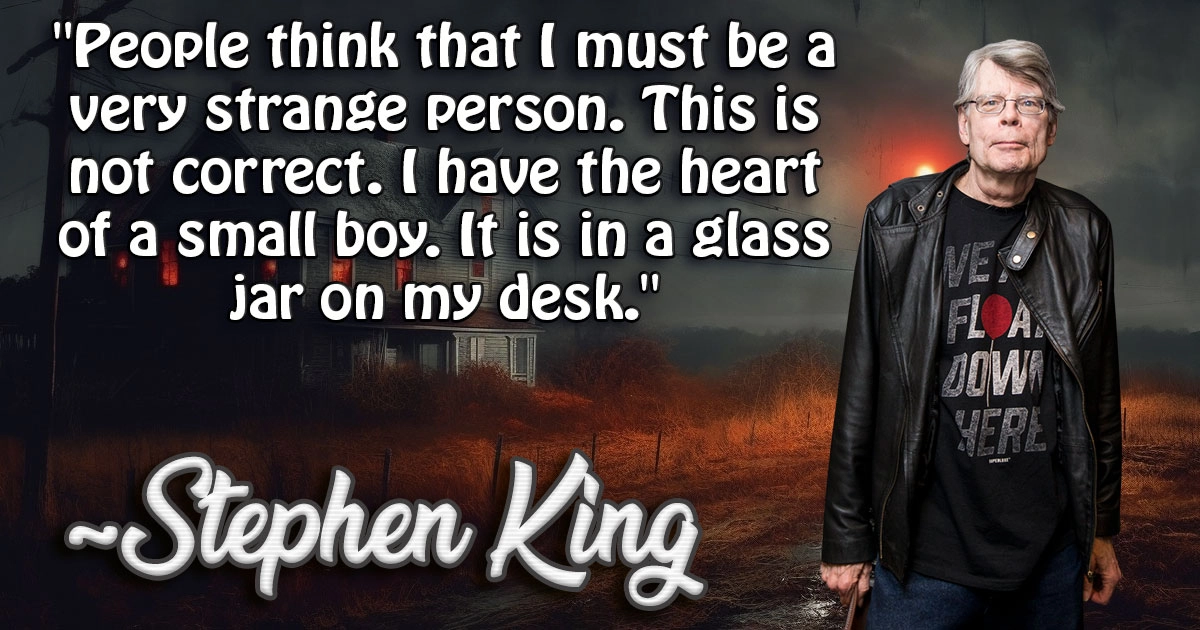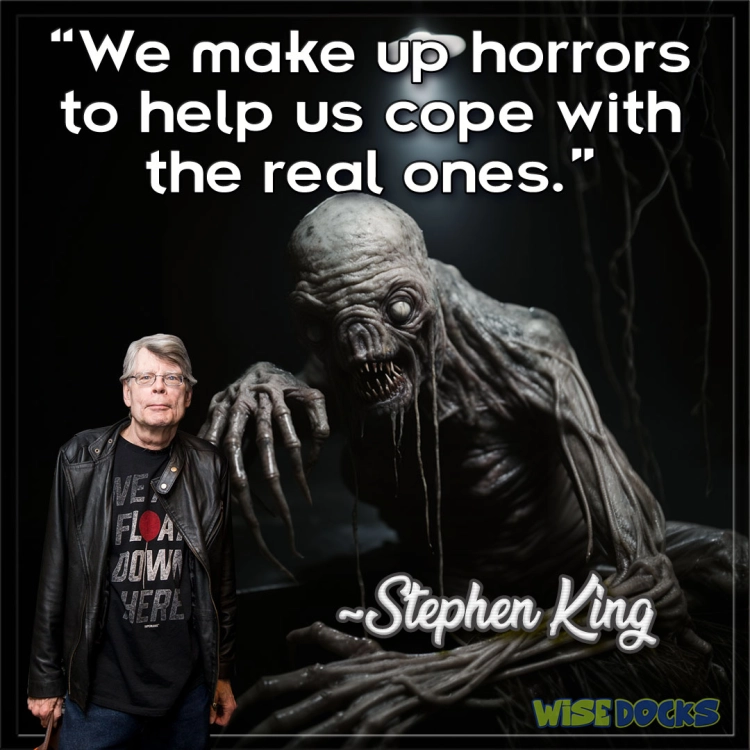Stephen King: The Master of Horror and the Art of Storytelling

Stephen King
Stephen King, the prolific author known as the "King of Horror," has captured the imagination of millions of readers around the world with his chilling tales, complex characters, and eerie settings. His journey from a struggling writer to a literary icon is a story of determination, creativity, and an unrelenting love for storytelling. King’s work goes far beyond horror, touching on deep human emotions, exploring psychological terror, and delving into moral complexities. His legacy is one of not just horror, but of literature itself.
Early Life: Roots in Fear and Fantasy
Stephen Edwin King was born on September 21, 1947, in Portland, Maine, to Donald and Nellie Ruth Pillsbury King. His early life was shaped by both personal struggles and a vivid imagination that would later fuel his writing. When Stephen was just two years old, his father abandoned the family, leaving Nellie to raise Stephen and his older brother, David, on her own. The family moved around frequently, living in several towns across Maine and Connecticut, struggling to make ends meet. These early hardships instilled in Stephen a sense of isolation and survival, themes that would often appear in his stories.
From a young age, Stephen was fascinated by storytelling. His love for reading started early, with comic books, horror stories, and science fiction fueling his vivid imagination. As a child, Stephen discovered the works of H.P. Lovecraft, an author whose cosmic horror and creeping dread would influence King's own future works. By the time Stephen was in elementary school, he was already writing his own stories, often inspired by the movies he watched at the local theater.
One particularly formative moment came when Stephen found a box of his father’s old horror and science fiction paperbacks. The works of authors like Ray Bradbury and Richard Matheson sparked his love for writing even further. These stories showed him that horror was not just about monsters and ghosts—it was about the fears lurking within the human mind.
Early Struggles: Persistence Pays Off
King’s love for writing continued throughout his teenage years and into adulthood. He attended the University of Maine, where he studied English and wrote for the school’s newspaper. It was during his college years that he met Tabitha Spruce, a fellow writer who would become his wife and lifelong supporter.
After graduating in 1970, Stephen struggled to find steady work. He took a job as a high school English teacher in Hampden, Maine, while working on his writing in his spare time. King’s early writing career was filled with rejections. He wrote numerous short stories and submitted them to magazines, only to receive rejection slip after rejection slip. He also started writing novels, but publishers showed little interest in them.
One of these early novels was a manuscript about a troubled teenage girl with telekinetic powers, titled "Carrie." Frustrated with the story, King tossed the manuscript into the trash, believing it wasn’t worth finishing. But Tabitha saw potential in it, pulled it out of the trash, and encouraged Stephen to keep going. Her support was pivotal—King completed "Carrie" and sent it to Doubleday Publishing. To his surprise, they accepted it, offering him a modest advance.
Shortly after, in 1974, "Carrie" was published, and Stephen King’s life would never be the same.
Breakthrough: The King of Horror is Born
"Carrie" became an instant success. The story of a bullied teenage girl who exacts revenge on her tormentors with her newfound psychic powers resonated with readers, especially young adults. The book's raw emotions, vivid descriptions, and intense climax were unlike anything else in horror at the time. It was both terrifying and heartbreaking, showing King’s skill at blending horror with deep character exploration. The success of "Carrie" allowed King to quit his teaching job and focus on writing full-time.
King followed up with a string of successful novels, each cementing his reputation as the master of modern horror. "Salem’s Lot" (1975), a chilling vampire tale set in a small town, and "The Shining" (1977), the story of a haunted hotel and a man’s descent into madness, showcased King’s ability to combine psychological depth with supernatural terror. "The Shining" in particular became one of his most iconic works, immortalized in Stanley Kubrick’s 1980 film adaptation, though King himself famously disliked the film’s deviation from his novel.
Throughout the 1970s and 1980s, King’s books dominated bestseller lists. Novels like "The Stand" (1978), "Pet Sematary" (1983), and "It" (1986) introduced readers to unforgettable characters and terrifying creatures, from the menacing clown Pennywise to the apocalyptic virus known as Captain Trips. King’s stories weren’t just about the monsters, though. They explored themes of fear, loss, childhood trauma, and the darkness within the human soul.
Despite his success, King’s personal life was not without challenges. During the height of his fame in the 1980s, King struggled with substance abuse. Alcohol and drugs became a coping mechanism for the pressures of fame and his own personal demons. King later admitted that during this time, he barely remembered writing some of his novels, including "Cujo" (1981). It wasn’t until his family staged an intervention that he sought help and became sober in the late 1980s.
Beyond Horror: Exploring New Genres
While Stephen King is most famous for his horror novels, his body of work extends far beyond the confines of the genre. He has written in multiple genres, including fantasy, science fiction, and crime fiction. His "Dark Tower" series, which began with "The Gunslinger" (1982), is an epic fantasy that blends elements of Westerns, horror, and science fiction. The series became one of King’s most ambitious projects, spanning eight novels and decades of work. The "Dark Tower" universe also connects to many of King’s other books, creating a complex and interwoven literary world.
King has also written critically acclaimed non-horror works, such as "The Green Mile" (1996), a supernatural drama set on death row, and "Rita Hayworth and Shawshank Redemption," a novella from his collection "Different Seasons" (1982). The latter was adapted into the film "The Shawshank Redemption" (1994), which is considered one of the greatest films of all time.
King’s ability to write across genres while maintaining his distinct voice has earned him respect not only as a horror writer but as a master storyteller. His works often blur the line between genre fiction and literary fiction, challenging preconceived notions of what popular fiction can achieve.
Personal Struggles and a Near-Fatal Accident
In June 1999, Stephen King’s life nearly ended in a horrific accident. While walking near his home in Maine, King was struck by a van driven by a distracted driver. He suffered multiple serious injuries, including a collapsed lung, broken bones, and head trauma. The accident left him in excruciating pain and required several surgeries to repair the damage.
For a time, King feared he might never write again. The physical pain, coupled with the mental toll of the accident, made it difficult for him to focus on his work. But, true to his resilient spirit, King eventually returned to writing. The accident became a turning point for him, both personally and creatively. He wrote about the experience in his memoir "On Writing" (2000), a book that offers insights into his life, his craft, and the accident that almost took everything from him.
King’s Influence on Culture and Beyond
Stephen King’s influence on popular culture is immeasurable. Over the course of his career, he has written more than 60 novels, sold over 350 million books worldwide, and seen countless film, television, and stage adaptations of his work. Many of these adaptations, such as "The Shining," "It," and "Misery," have become iconic in their own right.
King’s works have not only shaped the horror genre but have also impacted how readers and writers view storytelling itself. His ability to create richly detailed worlds and deeply human characters has elevated genre fiction to new heights. Authors like Neil Gaiman, Joe Hill (King’s own son), and countless others have cited King as a major influence on their work.
King’s commitment to the craft of writing, even after decades of success, remains inspiring. He continues to publish new works regularly, showing no signs of slowing down. Novels like "Doctor Sleep" (2013), a sequel to "The Shining," and "The Outsider" (2018) prove that King’s talent for blending the supernatural with psychological depth remains as sharp as ever.
The Storyteller Who Never Stopped
Stephen King’s journey from a struggling writer to the undisputed master of horror is a story of perseverance, creativity, and an undying love for the art of storytelling. His works have haunted, inspired, and moved readers for decades, making him one of the most celebrated and influential authors in modern literature.
At his core, Stephen King is a storyteller who understands that the scariest monsters aren’t always lurking in the dark—they’re often found within ourselves. His stories remind us of the fears we carry, the battles we fight, and the strength we find in facing them. Whether he’s writing about a haunted hotel, a killer clown, or a prison break, King’s work continues to resonate with readers of all ages, ensuring that his legacy will endure for generations to come.






